Cute, cuddly, and affectionate, aussiepoos, otherwise known as aussiedoodles, are highly sought-after dogs.
Resulting from a cross between an Australian shepherd and a poodle, aussiepoos have adopted some of the best characteristics of the two breeds, making them highly desirable pets.
TABLE OF CONTENTS
Appearance
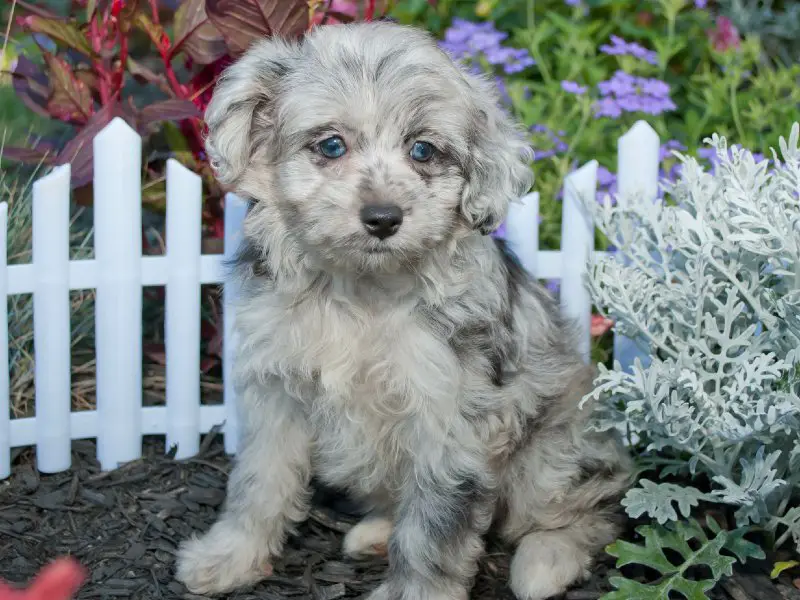
Floppy-eared with shaggy fur, Aussiepoos looks like big, cuddly teddy bears!
They are generally considered small-to-medium-sized dogs, coming in at 13-24’’ tall and weighing between 25-70 pounds. Their size is mostly affected by the size of their Poodle parents.
Miniature Aussiepoos are another common variation, resulting from the mix of an Australian Shepherd with a Miniature Poodle. These tiny dogs are generally 12-18” tall and weigh 12-28 pounds.
Due to the colorful coats of their Australian Shepherd lineage, Aussiepoos are multi-colored, with any combination of white, tan, black, brown, grey, and blue. With infinitely many different color combinations, it is impossible to accurately predict what color an Aussiepoo will be based on the parent’s coat color.
Depending on the parent Poodle’s coat, Aussiepoos can have wavy hair or more tightly coiled curly hair.
Aussiepoo Personality and Temperament
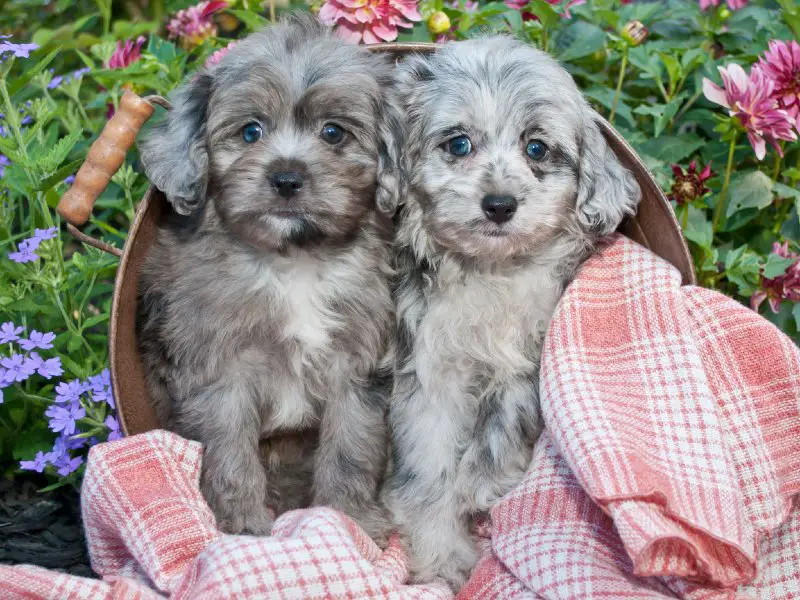
Aussiepoos have been known to have a great temperament, making them wonderful, affectionate dogs. They are non-aggressive and extremely devoted and loyal to their owners. Aussiepoos love to be cuddled and pet, often trying to be lap dogs despite their larger size!
Despite not being too large, they are not well-suited for apartments or condos and do much better in houses with access to a backyard. They are extremely high-energy and require extensive playtime and interactions.
Due to their high demand for attention, Aussiepoos are known to act out when not given the love they need. Aussiepoos are prone to suffering from separation anxiety, and cannot be left alone for extended periods. If you are someone who works away from home all day and don’t not have someone who can stay with your dog, an Aussiepoo is not suitable for you.
As with humans, dogs each have their distinct personalities. Although general personality traits can be given for Aussiepoos in general, your dog will be unique in its behavior and temperament.
In general, a dog’s temperament is based on its genetics and the temperament of its parents, and its environment, including how well it was trained and how socialized it is. So, although your pet will have its innate personality, how you train and treat it will also affect its temperament!
Is an Aussiepoo a Good Family Dog?
Aussiepoos are a great family dog, getting along well with children and strangers. As they love to be around people and in the center of the action, Aussiepoos will do very well in a busy, loving household.
To avoid any potential problems or behavioral issues, ensure that your Aussiepoo is socialized with children and strangers early on in its life.
Many Aussiepoos display herding tendencies, stemming from their Australian Shepherd lineage, making them wonderful babysitters to kids. Their playful and energetic nature means they can spend hours playing with your children and keeping everyone entertained.
Just as you need to train your dog to interact with children, make sure to teach your kids how to positively interact with dogs and how to understand their body language. Aussiepoos are super curious and will likely follow you and your children anywhere you go, looking for anything to play and interact with.
Aussiepoos are also great with other dogs, especially dogs of similar temperaments. Cohabiting your Aussiepoo with another dog will allow them to bond and reduce any suffering from being left alone. This will also allow your pets to stay stimulated, playing and exercising without needing your constant attention!
How to Train an Aussiepoo
As both Australian Shepherds and Poodles are considered very intelligent breeds, Aussiepoos are also very smart, quick learners! Eager to please their owners, Aussiepoos are one of the easiest breeds to train and are considered good dogs for novice owners.
Start training your puppy as soon as you take him home. Younger dogs are much easier to train, and establishing a routine is a lot easier than trying to change the habit later on in life. During this period, slowly sensitize them to children, other animals, as well as common household noises such as the vacuum and washing machine.
Aussiepoos respond best to positive reinforcement training, using treats or playtime as a reward for correctly performing a command. Oftentimes your dog will react better to a certain type of positive reinforcement, for example preferring treats over a toy. Observe their preferences and use them to your advantage to get the most out of your training.
As with any dog, training will require patience and consistency from the owner. Avoid harsh punishments as they can lead to anxiety and behavioral problems such as biting and barking. Some dogs will often purposely act out if negative reinforcement is used, which will hinder you from achieving the desired results.
The more you train them, the more attentive they become. Training your Aussipoo will make them smarter and better behaved. Aussiepoos are also wonderful therapy dogs that will bond extremely well with their owner and remain attentive to their needs.
You can easily train them to assist you in daily tasks such as helping bring you things, opening or closing doors, and carrying stuff. Even for those who do not necessarily need help with tasks, training your dog to help with daily tasks will give them purpose and help keep them occupied.
As mentioned previously, your Aussiepoo is likely to display herding tendencies. For owners who find this behavior problematic, it is easy to be trained out, by distracting them with a toy or another command.
Training a puppy is no joke! During the training period, Aussiepoo puppies will need even more attention than usual, typically needing to be let out every 2-3 hours. Only consider getting your Aussiepoo puppy when you have the time to be home and attend to its every need.
If you do not have the time, or patience to train your Aussiepoo alone, consider taking a highly-rated training course. A well-developed training program should be tailored to your dog and your needs, offering you step-by-step guidance for all your problems.
Caring for an Aussiepoo
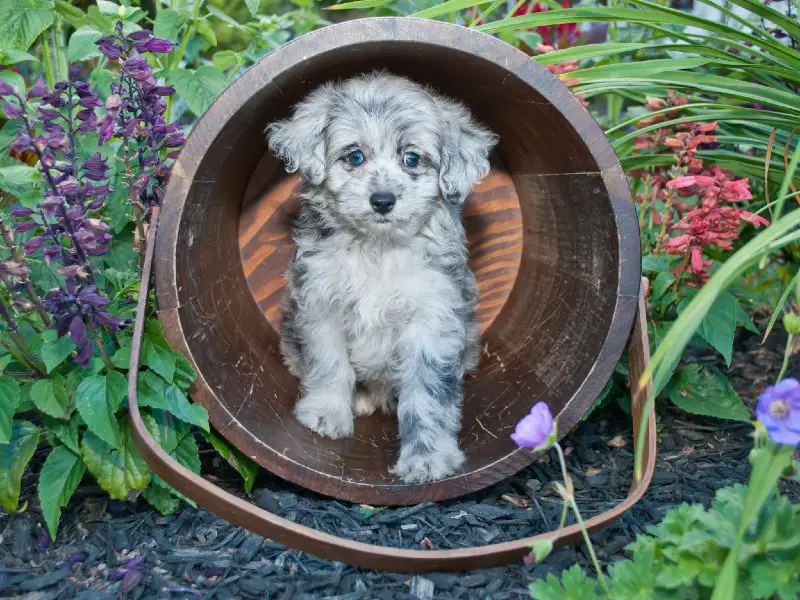
Exercise requirements
Like their Australian Shepherd parents, Aussiepoos are high-energy dogs that require a lot of exercise and playtime!
Aussiepoos will require at least one hour total of walks per day, in addition to at least 30 minutes of active playtime. It is recommended to split the walk time into several walks, with playtime in between.
Your pet will happily join you on your jog, walk, or bike ride, and will gladly play catch, Frisbee, or chase! Most Aussiepoos enjoy the water, especially if they are well sensitized to it, and will happily swim alongside you. Dog parks are great for exercise and social interaction.
In addition to physical exercise, your Aussiepoo will need mental stimulation as well. Puzzle feeders, hide and seek, and other cognitive games are a great way to keep your dog entertained and their mind sharp.
Despite their high-energy requirements, Aussiepoos are meant to be indoor dogs and should not be housed outside. Living in isolation from their humans will cause them to suffer from severe separation anxiety. If you are not able to provide an active lifestyle for your Aussiepoo, it is best to consider another, low-energy dog breed.
How will you know if your Aussiepoo is getting enough exercise? It’s easy! Bored dogs with pent-up energy will act out, often destroying furniture and chewing up objects, shoes, and clothing. If your Aussiepoo is displaying any signs of boredom or is frequently running around the house frantically, increase their exercise and playtime.
Grooming and shedding
As with all Poodle mixes, Aussiepoos are non-shedding hypoallergenic dogs. Non-shedding dogs are perfect for owners who cannot tolerate flying hairs and those who do not wish to vacuum frequently!
As they do not shed themselves, Aussiepoos require frequent brushing to remove their outgrown coat and prevent matting. It is recommended to brush them every couple of days, and even more frequently in the spring and fall when they are switching from their summer to winter coat, and vice versa.
With non-shedding dogs, grooming is a must. Grooming will often involve haircuts, to keep them looking their best. Groom your Aussiepoo every 8-12 weeks, or more frequently if it has a curlier coat.
In addition to brushing and fur trimming, your Aussiepoo will need nail trims every few months, as well as special care for their ears. Floppy ear dogs are prone to bacterial and yeast infections, so keeping your dog’s ears clean and dry is of utmost importance.
To maintain fresh breath and good oral health, frequent tooth brushing is also essential.
Feeding and diet
Your Aussiepoo will need a balanced diet of fats, proteins, carbs, nutrients, and minerals. In general, high-quality dry food is the easiest way to ensure your pet is receiving its necessary nutrient requirements. Other diets, such as raw food diets can also be used although they must be carefully selected and tailored to your dog’s needs.
Your pet will need to be fed 2-3 times a day, with about 1-2 cups of dry food, depending on their age and weight.
When looking for the right dog food brand for your dog, select a food that is specific for highly active dogs, and is labeled for the age of your dog. Young, adult and senior dogs all have different requirements and their food should reflect that.
If you are cooking for your Aussiepoo, make sure to carefully research the number of carbs, proteins, and fats it needs so that you are providing your pet with a balanced diet. Additionally, make sure to check that every ingredient you use is edible for your dog. Many human foods, such as avocados, onions, nuts, and chocolate are toxic to dogs!
Fresh fruit and veggies can be used as treats in moderation. Consider awarding your pet with veggies such as cucumbers, broccoli, carrots, and celery, and fruits such as apples, pears, bananas, oranges, and berries!
Depending on their health needs, your veterinarian might recommend a specialty diet or any supplements.
Known health problems
As crossbreeds, Aussiepoos are generally less susceptible to inheriting genetic disorders common for their Poodle and Australian Shepherd parents. However, this does not mean that they are immune from health disorders.
Aussiepoos are most susceptible to cataracts, hip and joint dysplasia, and obesity. Regular veterinary care is essential with Aussiepoos so that any health concerns can be identified early on and treated.
Cataracts result in the cloudiness of the eye lens, which can cause vision loss. Common symptoms include noticeable cloudiness of the eye, as well as signs of advanced vision loss including the inability to find items and bumping into objects.
Hip dysplasia is a painful condition, resulting from the loosening of the hip joint. Common signs include limping, having trouble standing, abnormal sitting positions, and unexpected lameness. Early diagnosis can help prevent the development of arthritis.
Aussiepoos love to eat, and if they do not get sufficient exercise, they are prone to weight gain. Do not get swindled by their adorable puppy eyes begging for more treats when they are already fat! Luckily, weight gain is the easiest ailment to control using portion control and exercise.
Vaccinations are also very important before your pet is allowed to explore the outside world and interact with other animals. Puppies from certified breeders will often come with their first set of vaccinations completed, though follow-up vaccines will be needed for puppies and adult dogs.
Despite genetic testing and good breeding practices, genetic disorders and other health conditions are always possible, so no breeder can guarantee your puppy will never have health problems. Your breeder should be able to provide you with accurate health records of your puppy’s parents. This will allow you to be aware of any potential health problems based on the family history, which can be monitored for.
With a balanced diet, sufficient exercise, and proper veterinary care, your Aussiepoo should live a happy and healthy life, for at least 10-13 years.
Buyer’s Guide
| Pros | Cons |
| Non-shedding and hypoallergenic | Require lots of exercise, including walks and varied playtime |
| Loving and affectionate, perfect for families | Require mental stimulation such as games and puzzles |
| Non-aggressive towards children and other animals | May display herding tendencies |
| Easy to train and eager to please | Cannot be left alone for extended periods |
| Great therapy dogs |

Aussiepoo puppies and adult dogs can be found at local animal shelters, on adoption sites, or at breeders.
Unfortunately, many owners underestimate the amount of time and effort training and caring for a high-energy dog takes, so Aussiepoos are often given away to adoption centers or sold online for a discount. Reaching out to your local animal shelter and searching for an online adoption center is a great place to start.
If you want to ensure a properly bred Aussiepoo, looking for a highly-rated breeder is your best bet. However, purchasing a puppy from a reputable breeder is not a one-and-done deal.
Many breeders have an in-depth interview procedure to ensure that their puppies get sent to loving, lasting homes. This means you may have to visit your breeder 2-5 times before picking up your puppy. During these visits, your breeder will ask important questions to confirm that you are aware of the care requirements and have adequate space and time for your future pet.
A reputable breeder will allow you to visit their space, see your future puppy’s parents, send you updates and photos, and allow you to interact with the puppies. They will also provide all the necessary lineage and family history, as well as full health history documents.
An experienced breeder can quickly and accurately pair you with a puppy that has a personality complementary to yours. Oftentimes owners will want to select a puppy based on its color rather than temperament, but a happy relationship is based on personality, not looks. Just remember, regardless of your Aussiepoos color, they are guaranteed to be the cutest dog on the block!
If you do not have any information about the family history of your puppy, consider performing a DNA test (many DNA testing kits are available online), to determine its lineage and confirm that it is a purebred Aussiepoo.
Just as when you are buying a car or a home appliance, extensive research and reading are necessary before you make the right choice. Dogs are loads of love and fun, just make sure to pick the right breed for you!
How much do Aussiepoo puppies cost?
When purchased from reputable, trustworthy breeders, Aussiepoos cost between $1000-2000. Mini Aussiepoos are usually more expensive, costing anywhere from $1500-2500. Aussiepoos from shelters and adoption centers generally cost less, anywhere from $100-800.
In addition to the purchase price, budget for an additional $1000-2000 for veterinary fees, vaccinations, neutering, training, and other home accessories such as crates and leashes, in the few months following your purchase.
Annual costs from then on can add up to $1000, for food, grooming, and veterinary checkups.
Quick Breed Summary Table
| Breed Characteristics | |
| Size: | 13-24 inches (Standard) 12-18 inches (Miniature) |
| Weight: | 24-70 pounds (Standard) 12-18 pounds (Miniature) |
| Lifespan: | 10–13 years |
| Coat: | Wavy to curly |
| Color: | Combination of white, tan, black, brown, grey, and blue |
| Do They Shed: | No, but frequent grooming is required |
| Temperament: | Loyal, loving, easy to train |
| Intelligence: | Highly intelligent |
| Socialization: | Gets along well with adults, children, dogs, and cats |
| Destructive Behavior: | Chewing and destroying furniture when bored or not sufficiently exercised |
| People Skills: | Non-aggressive and friendly with strangers. Extremely devoted to its owners |
| Good with Children: | Great with children |
| Activity Levels: | Extremely high energy, and needs lots of exercise and playtime |
Summary
Aussiepoos make for great pets! These intelligent, high-energy fluff balls are ideal family dogs, for anyone looking for a truly loving and devoted pet. They are highly trainable and non-aggressive and can keep you entertained for hours.
Suitable for active individuals who are home often, Aussiepoos are easily trainable and eager to please.
Getting the best genetic qualities from both parents, Aussiepoos display the same playful tendencies as Australian Shepherds, with the non-shedding qualities of Poodles! They are ideal for individuals with allergies and those who do not want to have dog hair flying around the house.
In the end, getting an Aussiepoo doesn’t just get you a pet. It gets you an additional family member and a best friend, who will love and cherish you forever.
What is an Aussiepoo?
Aussiepoos are a common crossbreed between Australian Shepherds and Poodles and are considered a designer breed. Their hybrid breed started in the late 1990s, early 2000s in North America and has since gained enormous popularity.
Depending on the size of the Poodle parent, miniature to medium-sized Aussiepoos are bred. Their coloration is hard to predict and is mostly dependant on their Australian Shepherd parent.
More Australian Shepherd and Poodle Mixes
Want an Australian Shepherd mix or Poodle mix but aren’t keen on the Aussiepoo? Check out these other hybrid dog breeds:
Australian Shepherd Mixes
- Australian Shepherd German Shepherd Mix
- Australian Shepherd Husky Mix
- Aussiedoodle
- Australian Shepherd Lab Mix
- Australian Shepherd Blue Heeler Mix
- Australian Shepherd Golden Retriever Mix
- Border Collie Australian Shepherd Mix
- Texas Heeler


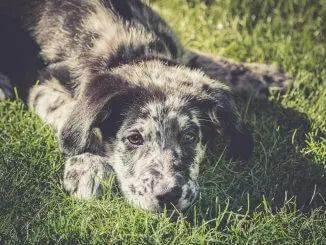
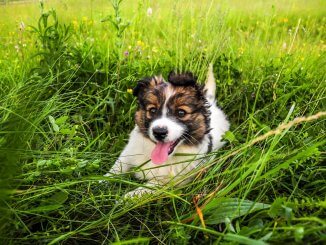
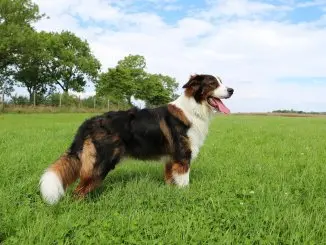

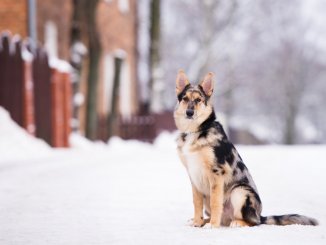
i love him or her so cute
i AM INTERESTED IN A MINIATURE AUSSIEPOO, FEMALE, BLUE EYES
I AM INTERESTED IN A MINIATURE AUSSIEPOO, FEMALE, BLUE EYES. IF ANYONE KNOWS WHERE THEIR BREEDERS ARE LOCATED. I LIVE IN NORTH CAROLINA, USA ….PLEASE CONTACT ME AT GARNERCRUISES@YAHOO.COM